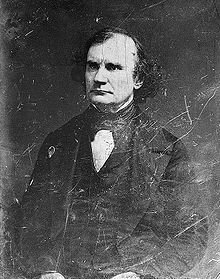James Murray Mason
| James Murray Mason | |
|---|---|
 |
|
|
United States Senator from Virginia |
|
|
In office January 21, 1847 – March 28, 1861 |
|
| Preceded by | Isaac S. Pennybacker |
| Succeeded by | Waitman T. Willey |
| President pro tempore of the United States Senate | |
|
In office January 6, 1857 – March 4, 1857 |
|
| Preceded by | Jesse D. Bright |
| Succeeded by | Thomas J. Rusk |
| Member of the U.S. House of Representatives from Virginia's 15th district | |
|
In office March 4, 1837 – March 3, 1839 |
|
| Preceded by | Edward Lucas |
| Succeeded by | William Lucas |
| Personal details | |
| Born |
November 3, 1798 Analostan Island, D.C., U.S. |
| Died | April 28, 1871 (aged 72) Alexandria, Virginia, U.S. |
| Political party | Democratic |
| Spouse(s) | Eliza Margaretta Chew |
| Alma mater | University of Pennsylvania, College of William and Mary (law) |
| Profession | Politician, Lawyer |
James Murray Mason (November 3, 1798 – April 28, 1871) was a United States Representative and United States Senator from Virginia. He was a grandson of George Mason and represented the Confederate States of America as appointed commissioner of the Confederacy to the United Kingdom and France between 1861 and 1865 during the American Civil War. In November 1861, Mason was among those captured by Federal troops during the Trent Affair in November 1861 while on a mission to England.
He was born on Analostan Island (now Theodore Roosevelt Island) in the District of Columbia, and was a graduate of the University of Pennsylvania (1818), receiving a law degree from the College of William and Mary in 1820.
He practiced law in Virginia and was a delegate to the Virginia Constitutional Convention of 1829-1830, and a member of the State house of delegates. He was elected to the Twenty-fifth United States Congress in 1836 as a Jackson Democrat.
In 1847, he was elected to the Senate after the death of Isaac S. Pennybacker, and was reelected in 1850 and 1856. Mason famously read aloud the dying Senator John C. Calhoun's final speech to the Senate, on March 4, 1850, which warned of disunion and dire consequences if the North did not guarantee the South permanently equal representation in Congress. Complaining of personal liberty laws that "Although the loss of property is felt, the loss of honor is felt still more," Mason also drafted the (second) Fugitive Slave Law of 1850, enacted on September 18, 1850 as a part of the Compromise Measures of that year. Mason represented the majority view in leading the Senate committee which investigated the John Brown raid on Harper's Ferry of October 1859. (Thus the document published as the U.S. Congress, Senate Select Commission on the Harper's Ferry Invasion (June 15, 1860) is often referred to as the Mason Report.) Mason was President pro tempore of the Senate during the Thirty-fourth and Thirty-fifth Congresses but was expelled from the Senate in 1861 for support of the Confederacy.
...
Wikipedia
